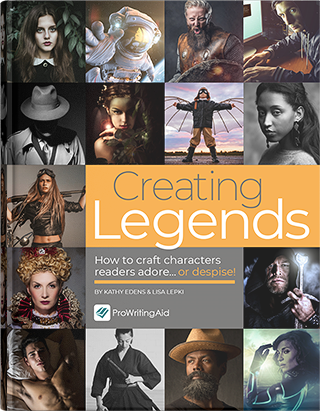
Every reader has their heroes: those writers who set their spines tingling and send the clock's hands spinning in great globs of lost time as you sit curled up on the couch, totally immersed in their work. They wrote the books you read that got you into writing in the first place.
In some ways, it's easy to think of these creators, The Greats, as demi-gods, somehow living on a higher plane than us lesser mortals. We tell ourselves their genius was unique, their work ethic unbeatable, their ability to craft and hone perfect sentences was, and always will be, the territory of the unattainable few.
We put up statues of them, dedicate whole museums to them, and make pilgrimages to their home towns, their graves, and the locations in their books. No matter how much we like to think we're like them, something in the back of our heads tells us it isn't the case. We'll never be great.
However, I believe that great writers are just people. Even the 'biggest' names in the game are actually like us in more ways than we occasionally think. Isn't it weird to think that Charles Dickens, Virginia Woolf, and Alice Walker all had to brush their teeth, too!
Writing Personalities
For all their similarities, The Greats do tend to exhibit certain differences between their lives and those of the many unsuccessful others. We know their names; we don't know the names of all the other writers trying and vying for their space in the sun.
However, for aspiring writers, I think it's more useful to see how similar we all are rather than different (and thus never able to attain the lofty heights of great writing). We can understand the traits that separate the best from the rest, and learn from them.
The Big 5
While there are many different ways to comprehend, define, and delineate personality and personality traits, one of the simplest and most straightforward methods is the Big 5, also called the OCEAN method, where our personalities are broken down into five groups:
- Openness to experience (outgoing/energetic vs. solitary/reserved)
- Conscientiousness (friendly/compassionate vs. challenging/callous)
- Extroversion (inventive/curious vs. consistent/cautious)
- Agreeableness (efficient/organized vs. extravagant/cautious)
- Neuroticism (sensitive/nervous vs. resilient/confident)
It can be easy to want to see ourselves as 100% one or the other. However, with the Big 5, it helps to think of ourselves as on greyscale in each category. The time and place we find ourselves in geographically and emotionally can also impact where we find ourselves one moment to the next.
What does all this have to do with writing? It seems to me that the better we understand ourselves, the better our writing can and most likely will become. If you want to write like a Great, get to know who you really are.
Emulation Doesn't Mean Imitation
It's easy to feel like you'll never write 2,000 words a day like Steven King or come up with entire fantasy universes like J. K. Rowling or George R. R. Martin, but what connects all these great writers, no matter how different they are, is that they are able to use their traits to their advantage.
When thinking about optimizing your writing and becoming a great writer, it helps to know thyself. Our personalities and traits are all different. It serves you not to try to fit yourself into someone else's box. Think about what your optimal writing environment is in order to maximize high-quality output.
Take inspiration from around you all the time, but don't handcuff yourself to it. Dylan Thomas wrote poems in a boathouse, Roald Dahl wrote stories sitting in a sleeping bag, and while you don't have to do either of those things, you do have to do what works for you.
Maximizing the benefit of your own personality traits is one of the best ways to become successful and possibly even a great writer. Plus, learning about personalities will inevitably help you create well-rounded, believable characters. Just ask David Lodge.
The Dark Side of Writer Traits
Beware of the negative or dark sides of each trait. For example, how many times have we seen promising, successful, hard-working writers (or any other creatives) ruin their career (and lives) by misusing drink or other substances? Think Hunter S. Thompson, Janis Joplin, Jimi Hendrix, Jack Kerouac, etc.
Being a creative person who enjoys experimenting and spending lots of time on their own with a notebook and pen can, at the best of times, lead to world-changing literature and some of the greatest writing of all time.
On the other hand, if left unchecked, some of the same tendencies that push writers to create better and better novels, plays, poetry, essays, and blogs are exactly the same traits that can sabotage and destroy them.

Getting to know yourself and your personality can help you spot and ward off the dangerous and destructive tendencies.
Balance Is Key
If you know you have a tendency to shun people and work in solitary all day long, why not take up a hobby where you're forced to interact with people in the evening. If you lead a sedentary life, why not get some exercise? If you find it hard to sit down for longer than 5 minutes, why not try meditating for ten?
It's often by challenging our comfort zone that we gain a new perspective and strengthen our ability to see and write the truth, which has to be one of the top goals of all writers. By playing off our personality, both complimenting and conflicting it, we can improve our writing, dialling it up from just good to great.
Finish Your Work
One of the few consistencies that exist between great writers as disparate as Donna Tartt, Malorie Blackman, and Don Delillo is that they finish their work. If there's one thing all great writers have in common is their ability to turn their back on their past successes, put it down, and start something new.
This means being confident enough to say a job is done, stop tinkering, and publish. One of the most important ways to separate yourself from the rest is by getting yourself out there. Unless you want to be like Herman Melville, unknown until almost a hundred years after his death, you have to finish and actively broadcast your work.
This means publishing, but it also means actively searching criticism and trying to work your characteristics to your strengths. Sometimes this means swallowing your pride and taking advantage of all the awesome content out there to review the basics.
If you're wondering how to improve character development or wrap your head around story structure, then fear not, there's plenty out there to help!
Great Writers Need Great Tools!
There's one thing that many of the great writers didn't have access to – writing apps!
Investing in some good writing technology can help you focus on becoming a great writer without worrying about grammar rules. ProWritingAid includes a brilliant grammar checker but also goes way beyond grammar checking to help you improve the style and clarity of your writing. The editor analyses your text and highlights a variety of key writing issues, such as overused words, sentence structure, punctuation issues, repeated phrases, consistency, dialogue, pacing and readability. ProWritingAid helps you learn as you edit, making you a stronger writer.
Good luck and happy writing!


